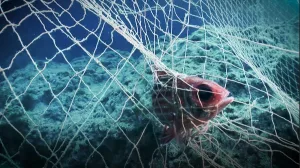The Underwater Menace Decimating Marine Life.
Lost, or abandoned fishing gear, also known as “ghost gear,” has emerged as a major danger to marine biodiversity. These fishing-related remains continue to entangle and kill marine life long after they were intended for use, causing severe ecological and economic damage.
The Scale of the Problem
Ghost gear is a collection of fishing devices such as nets, lines, traps, and pots that have been abandoned in maritime habitats, either accidentally or on purpose. According to the Global Ghost Gear Initiative (GGGI), this derelict equipment makes up a significant fraction of marine trash, posing serious threats to ocean health.
The United Nations has underlined the negative impact of ghost gear on marine ecosystems. UN Biodiversity recently said that such gear “hinders marine biodiversity,” emphasising the importance of resolving this issue.
 Impact on Marine Life
Impact on Marine Life
Ghost gear continues to capture and kill marine species arbitrarily, a process known as “ghost fishing.” Fish, turtles, seagulls, and marine animals become entangled, resulting in injuries, malnutrition, and death. According to the World Wildlife Fund (WWF), ghost gear harms precious marine habitats such as coral reefs and seagrass beds, hence upsetting natural balance.
Furthermore, ghost gear adds to the larger issue of plastic pollution. As these materials decompose, microplastics are released into the ocean, where they are consumed by marine creatures and may eventually reach the human food chain.
Economic and Human Implications
The consequences of ghost gear go beyond environmental damage. Fisheries incur economic losses as a result of depleted fish stocks and damaged equipment. Furthermore, ghost gear creates navigational risks that harm vessels and personnel. Communities that rely on fishing and tourism face threats to their livelihoods as maritime environments deteriorate.
Global Initiatives and Solutions
Addressing the phantom gear epidemic demands worldwide coordination. The GGGI is a multi-stakeholder partnership that works to mitigate the effects of abandoned fishing gear. Their activities are directed towards increasing the health and productivity of marine ecosystems, conserving marine wildlife, and ensuring human health and livelihoods.
Preventative approaches include improving gear management techniques, producing biodegradable fishing gear, and improving reporting and recovery mechanisms for lost equipment. Raising awareness among fishing communities and the general public is critical for promoting responsible practices and gaining support for regulatory reforms.
Conclusion
Ghost gear is a ubiquitous and insidious threat to marine biodiversity. Comprehensive measures incorporating prevention, mitigation, and stakeholder participation are required to tackle this underwater threat and ensure ocean health for future generations.

Leave A Comment
You must be logged in to post a comment.